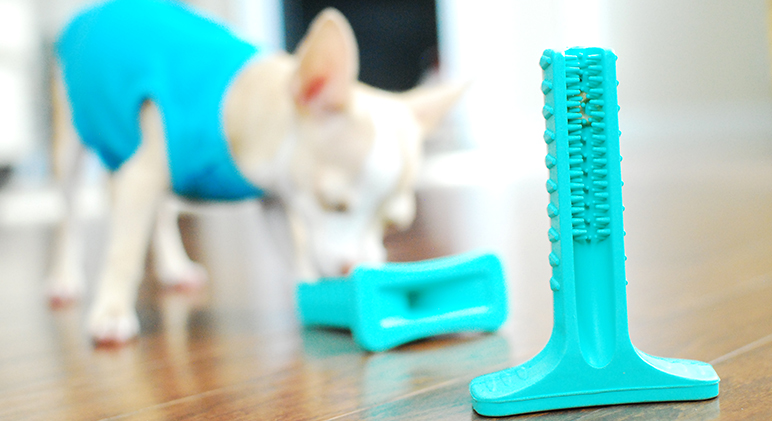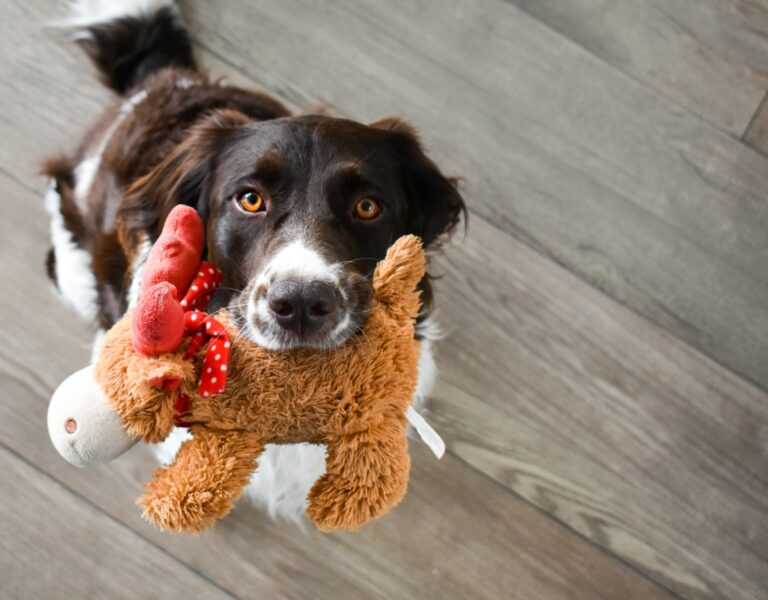The dental health of our furry friends is often overlooked, yet it plays a significant role in their overall wellbeing. Particularly for small breeds, maintaining optimal oral health can pose a unique challenge. With their tiny teeth and delicate gums, finding suitable dental-friendly toys can be a tough task. In the subsequent content, we delve into “Tiny Teeth, Big Smiles: Dental-Friendly Toys for Small Breeds” and provide valuable insights on this topic.
Many pet owners underestimate the importance of dental care for their pets, often leading to serious health issues. Oral diseases can cause discomfort, and in severe cases, may lead to systemic diseases. Luckily, there’s a fun and effective way to maintain your pet’s oral health – dental-friendly toys. This content will provide a comprehensive guide to the best dental-friendly toys for small breed dogs that not only provide entertainment but also promote healthy dental hygiene.
Equipping yourself with knowledge on the right kind of toys for your small breed dog can make a huge difference in their oral health and overall happiness. From understanding the role of dental-friendly toys to identifying the best ones in the market, this content is your go-to guide. Let’s dive into the world of dental-friendly toys for small breeds, where tiny teeth translate into big smiles.
Understanding the Dental Needs of Small Breed Dogs
As an owner of a small breed dog, it’s essential to understand the dental needs of these pets. Similar to humans, dogs have two sets of teeth throughout their lifetime. Their baby teeth, also known as deciduous teeth, begin to appear when they are just 3 to 6 weeks old. By the time they are 6 to 8 months of age, these teeth are replaced by a full set of permanent teeth.
For small breed dogs, dental care is particularly important due to their anatomy. Their smaller mouths often lead to overcrowded teeth, which can create tight spaces where food and bacteria become trapped. This situation increases the likelihood of plaque buildup, gingivitis, and ultimately periodontal disease. Statistics show that by the age of three, approximately 80% of dogs will have some form of dental disease — and small breeds are especially prone.
If left untreated, periodontal disease does not just affect the mouth. The bacteria can enter the bloodstream, impacting major organs like the heart, kidneys, and liver. Therefore, a proactive approach to dental care is vital for the long-term health of small dogs.
The Role of Dental-Friendly Toys
Dental-friendly toys are more than just playthings — they are functional tools designed to improve your dog’s oral health. These toys help by scraping away soft plaque, massaging the gums, and encouraging chewing behaviors that support dental hygiene. They also promote saliva production, which is essential for neutralizing bacteria in the mouth.
These toys are particularly helpful for dog owners who struggle to brush their dog’s teeth regularly. While brushing remains the gold standard in canine dental care, dental toys serve as an excellent supplementary method, especially when used daily.
For puppies, these toys can ease the discomfort associated with teething. For older dogs, they can prolong dental health and delay the onset of dental issues.
Selecting the Right Dental-Friendly Toys
Selecting the right dental toy for a small breed requires careful consideration of several factors. Small dogs have delicate jaws, so not every toy designed for dental purposes is suitable for them.
Size and Shape
Choose a toy that fits comfortably in your dog’s mouth. It should not be so small that it could pose a choking hazard or so large that your dog cannot grip it easily. The ideal toy allows your dog to chew naturally without straining their jaw.
Toys shaped like bones, balls, or sticks are popular, but make sure the shape doesn’t prevent effective chewing. Some toys also feature flexible arms or extensions that help clean hard-to-reach back teeth.
Texture and Surface
Look for toys that feature ridges, nubs, or bristles. These surface features help scrape off plaque and massage the gums as your dog chews. Softer textures are ideal for small dogs with sensitive teeth, while firmer textures are better suited to more enthusiastic chewers.
Some dental toys are designed with brush-like bristles or grooves where dog toothpaste can be applied to enhance cleaning action. These can be especially effective for dogs who resist traditional brushing.
Material and Safety
Always choose toys made from durable, non-toxic materials. Materials like rubber, nylon, and thermoplastic elastomer are often used for dental toys due to their strength and flexibility.
Look for certifications on packaging such as BPA-free, phthalate-free, or FDA-approved materials. Avoid toys that contain harmful dyes or small parts that can be chewed off and swallowed.
Innovative Features That Enhance Dental Benefits
Some dental toys go beyond basic design and include features that offer added value. For example:
Treat Dispensing Toys: These stimulate extended playtime and offer mental stimulation while encouraging prolonged chewing.
Cooling Toys: Certain toys can be frozen to soothe inflamed gums, making them perfect for teething puppies or senior dogs with dental sensitivity.
Interactive Chews: Some toys incorporate sound or scent to attract your dog’s attention and promote engagement, keeping them focused on chewing for longer durations.
The longer your dog chews, the more effective the toy will be at cleaning their teeth and supporting gum health.
Best Dental-Friendly Toy Options for Small Breeds
Here are some well-reviewed dental toys that are especially suitable for small dogs:
1. KONG Puppy Teething Stick
This KONG toy is made from gentle rubber that is ideal for teething puppies and smaller jaws. It has ridges designed to clean teeth and soothe gums. You can even add toothpaste to its grooves for added benefit.
2. Petstages Dental Chew Pack
This pack includes multiple textured toys that target different aspects of dental health. It’s lightweight, which is ideal for small dogs, and includes rope fibers that act like floss as your dog chews.
3. Nylabone Dental Dinosaur Chew
Fun in shape and function, this chew toy is made of durable nylon and features raised bristles that help clean teeth and control plaque. Its unique dinosaur shape makes it easy for dogs to grip.
4. Arm & Hammer Super Treadz Gorilla
Infused with baking soda, this rubber toy provides extra cleaning power. It’s highly durable and textured to remove tartar buildup effectively while being soft enough for small dogs to chew.
Incorporating Dental Toys Into Your Dog’s Routine
It’s not enough to just give your dog a toy and hope for results. You need to incorporate dental toys into your dog’s daily routine intentionally. Allocate specific times of day for chewing activities, ideally after meals, to encourage cleaning action when it’s most needed.
Rotate dental toys regularly to maintain interest and avoid boredom. Keep an eye on each toy’s condition and replace them at the first sign of damage to prevent your dog from ingesting pieces.
Signs Your Dog’s Dental Toy Is Working
If you’re consistent in providing dental-friendly toys, you should start to notice some signs that they’re working:
Your dog’s breath smells fresher
You notice less visible tartar on their teeth
Their gums look healthier (pink rather than red or inflamed)
Your vet reports better oral health during checkups
Keep in mind that dental toys are most effective when combined with regular brushing and professional cleanings.
Preventing Dental Issues in Small Breeds
To prevent dental issues, establish a dental care plan that includes:
Daily use of dental toys
Regular brushing (at least three times a week)
Routine vet dental exams (ideally once a year)
Dental-specific diets or treats if recommended by your vet
Early intervention is key. Monitoring your small dog’s dental health from an early age will save you from more serious (and expensive) problems later in life.
Top Dental-Friendly Toys for Small Breeds
KONG Classic Dog Toy
The KONG Classic Dog Toy is a popular choice among small breed dog owners. It’s made from durable rubber that is safe for your pet and can withstand aggressive chewing. Its unique shape not only entertains your pet but also cleans their teeth and soothes their gums.
Nylabone DuraChew Dental Chew Toy: A Trusted Solution
The Nylabone DuraChew Dental Chew Toy has long been a favorite among pet parents, especially those with small breed dogs. Designed specifically to address common dental issues, this toy serves multiple functions that go beyond simple entertainment.
Crafted from durable nylon, the Nylabone DuraChew withstands extended chewing sessions, making it ideal for enthusiastic small dogs that love to gnaw. The textured surface helps scrape away plaque and tartar, two primary culprits of periodontal disease in dogs. Over time, consistent use can contribute to cleaner teeth and fresher breath.
What sets this toy apart is its enticing flavor options. Available in bacon, chicken, and peanut butter, the toy appeals to a dog’s sense of taste and smell, encouraging them to chew more frequently. This is particularly helpful for dogs that are hesitant to chew or have minimal interest in traditional dental toys.
Its ergonomic design is also worth noting. The bone shape is easy for small dogs to grip between their paws, allowing for stable and efficient chewing. Whether you have a teething puppy or an adult dog with strong jaws, the Nylabone DuraChew delivers lasting value for your dog’s dental regimen.
Maintaining Your Dog’s Dental Health with a Holistic Approach
While toys like the Nylabone DuraChew are highly effective in maintaining oral hygiene, they should be viewed as part of a broader dental care strategy. A comprehensive approach ensures your pet’s mouth remains healthy throughout their life.
Daily Toothbrushing: The Gold Standard
Regular brushing remains the most effective way to remove plaque and prevent tartar buildup. Aim to brush your dog’s teeth at least 2 to 3 times a week using a pet-safe toothbrush and canine toothpaste. Never use human toothpaste, as it contains ingredients like xylitol that can be toxic to dogs.
Start slowly, introducing your dog to the process with patience and praise. If your dog resists brushing, gradually increase the frequency and duration over time, always making the experience positive.
Dental Chews and Specialized Diets
Alongside toys, dental chews and veterinarian-approved dental diets can significantly support oral health. Dental chews are often textured and coated with agents that reduce plaque and freshen breath. These are excellent for dogs who may not tolerate brushing but still need consistent dental care.
Certain dry kibbles are also formulated to help clean teeth by breaking apart in a way that scrapes the teeth as the dog chews. Speak with your veterinarian about choosing the right dental diet if your dog is at risk for oral issues.
Water Additives and Oral Gels
Water additives and oral gels offer a convenient way to combat bacteria and freshen breath. These products usually contain enzymes or antimicrobial agents that reduce plaque and fight bad breath. While they are not substitutes for brushing, they are beneficial in between cleanings, particularly for dogs who are not cooperative with more hands-on methods.
Regular Veterinary Checkups
Your veterinarian plays a crucial role in maintaining your dog’s dental health. Annual dental exams help detect problems early before they develop into more serious conditions. If necessary, your vet may recommend professional cleanings under anesthesia to remove tartar buildup and examine the teeth below the gumline.
During these appointments, your vet will also assess for signs of gingivitis, loose or fractured teeth, abscesses, or oral tumors. Early detection is key to preventing complications that could affect your dog’s overall health.
Understanding the Risks of Neglected Dental Care
Failing to prioritize dental hygiene can result in severe health consequences for your dog. Beyond visible issues like yellow teeth or bad breath, undetected dental disease can cause intense pain and systemic problems.
Chronic oral infections can spread to other parts of the body via the bloodstream, particularly the liver, kidneys, and heart. This can lead to conditions such as endocarditis or kidney failure, both of which require intensive treatment and may drastically shorten your dog’s lifespan.
Additionally, dental disease is a leading cause of weight loss and appetite decline in senior dogs. Painful chewing leads to food avoidance, which can spiral into malnutrition or exacerbate existing conditions.
Establishing a Routine from an Early Age
One of the best ways to ensure strong dental health is to start young. Puppies can be introduced to brushing and dental toys as early as 8 weeks old. Even if they still have their deciduous (baby) teeth, early exposure helps normalize the routine.
Choose soft, flexible dental toys like the puppy-specific versions of the Nylabone DuraChew to accommodate their sensitive mouths. Gradually introduce brushing using a finger brush or gauze wrapped around your finger. Over time, your dog will become more tolerant of dental care activities.
Encouraging Safe and Consistent Use of Dental Toys
To maximize the benefits of dental toys like the Nylabone DuraChew, rotate them regularly and inspect them for signs of wear. Although designed for durability, all chew toys eventually degrade. Replace the toy if it becomes too small, splinters, or shows cracks.
Always supervise your dog when introducing a new toy. Even the safest toys can pose risks if your dog chews too aggressively or attempts to swallow large chunks.
Consider storing toys in a clean, dry area and washing them with pet-safe soap every few days. Hygiene is just as important as safety when it comes to objects that spend time in your dog’s mouth.
Conclusion
In conclusion, investing in dental-friendly toys for your small breed dogs not only provides a source of entertainment but also significantly contributes to their oral health. These toys are meticulously designed to gently clean your pet’s teeth, remove plaque and tartar, and promote healthy gums. They not only result in “Tiny Teeth, Big Smiles” but also spare your pet from possible oral infections and diseases.
As pet parents, our furry friends’ health and happiness should be a top priority. By incorporating these toys into their daily routine, we make their playtime more productive and beneficial. The various shapes, sizes, and flavors available ensure your pet will never tire of these dental-friendly toys.
However, remember, these toys are not replacements for regular dental check-ups. Professional cleanings and examinations are still paramount for your pet’s overall dental health. Let’s give our small breed dogs the care they deserve and invest in toys that will bring them joy and maintain their adorable smiles.🐶💕
To recap, dental-friendly toys are essential tools that contribute to your small breed dog’s dental health. They offer fun and enjoyment while promoting oral hygiene. So, let’s transform their playtime into a healthy dental routine and keep their tiny teeth shining bright. After all, a healthy pet is a happy pet.



